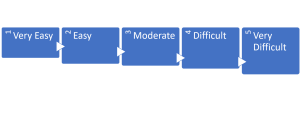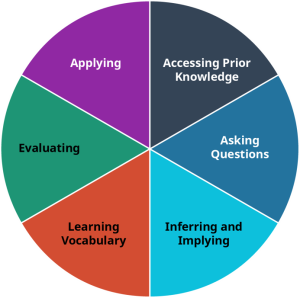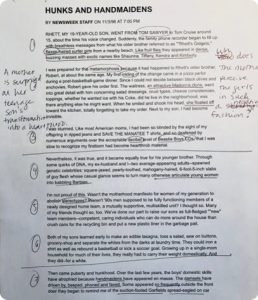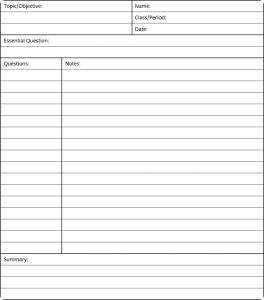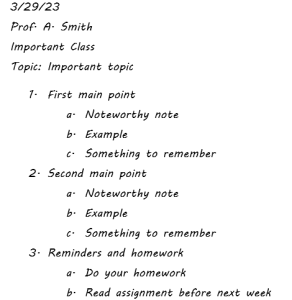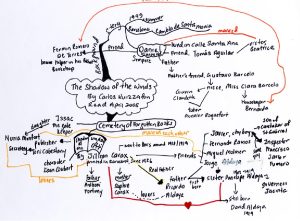Reading and Note Taking
Learning Outcomes
1. Discuss the way reading differs in college and how to successfully adapt to that change.
2. Demonstrate the usefulness of strong notetaking for college students
Stop and Think!
On a scale of 1 (I need significant improvement) to 4 (I’m doing great), reflect on how you’re doing right now on these statements:
- I am reading on a college level.
- I take good notes that help me study for exams.
- I understand how to manage all the reading I need to do for college.
- I recognize the need for different notetaking strategies for different college subjects.
Why did you answer the way you did? What experiences have you had (positive and negative) with reading and note-taking in an academic setting?
Active Reading
“[R]eading volume [how much you read] made a significant contribution to multiple measures of vocabulary, general knowledge, spelling, and verbal fluency.” -Cunningham and Stanovich
Jot down your responses to these questions:
- What are the pros and cons of online reading?
- How can distinguishing between reading types help you academically and personally?
- How can you best prepare to read for college?
-
What is the most influential factor in how thoroughly you read the material for a given course?
- How engaging the material is or how much I enjoy reading it.
- Whether or not the course is part of my major.
- Whether or not the instructor assesses knowledge from the reading (through quizzes, for example), or requires assignments based on the reading.
- Whether or not knowledge or information from the reading is required to participate in lecture.
-
What best describes your reading approach for required texts/materials for your classes?
- I read all of the assigned material.
- I read most of the assigned material.
- I skim the text and read the captions, examples, or summaries.
There are two primary objectives you will have when reading for college:
- Reading to introduce ourselves to new content, OR
- Reading to more fully comprehend familiar content.
Depending on which is your objective with any particular reading assignment, your strategies and the time you budget for your reading will be different.
Reading to Learn More
- How does reading about something you already know differ from reading unfamiliar content?
- Have you ever been overconfident about your knowledge?
- What can you do to make sure you get the most out of your reading?
Source: The Open University (2018). Active reading. http://www2.open.ac.uk/students/skillsforstudy/active-reading.php
Following are descriptions of three important skills for active reading: previewing, recursive reading, and annotating.
Active Reading Review
Preview
Skim the textEstimate difficultyDetermine main ideaHighlight
Find a distraction-free settingHighlight important passagesLook up unfamiliar wordsAnnotate
Mark it up!Make connectionsAsk questions
One final reading consideration: What kinds of reading does your major require?
Depending on your chosen degree, you will likely encounter different kinds of reading. Here are some common categories for college reading assignments:
- Articles
- Chapters
- Books
- Primary sources
- Technical writing
Each may look very different, but the steps outlined above will be helpful for all of them. If you struggle with learning how to best approach the reading assignments in a class, reach out to your instructor or to the CWI Tutoring Center.
Notetaking
Jot down your responses to these questions:
- What best describes your notetaking style?
- I use a systematic method such as the Cornell method or something similar.
- I highlight or underline all the important information.
- I create outlines and/or note-cards.
- I use an app or program.
- I write notes in my text (print or digital).
- I don’t have a style. I just write down what seems important.
- I don’t take many notes.
-
Do you currently have a preferred way to take notes? When did you start using it? Has it been effective? What other strategy might work for you?
-
How can you prepare to take notes to maximize the effectiveness of the experience?
-
What are some specific strategies you can employ for better notetaking?
-
Why is annotating your notes after the notetaking session a critical step to follow?
Notetaking Systems
There are many different possible ways to take notes. You might take traditional pen and paper written notes in a notebook. Perhaps you prefer typing so you use a laptop or tablet to take notes. In some settings, you might take notes on note cards (also called index cards). Or maybe you are taking notes while you read and write notes directly in your textbook.
Regardless of the format of your notes, you should always include the following information:
- Date
- Course Name
- Chapter or Topic
Following are three common notetaking systems. Whether one is a good option for you to use can depend on many different factors, from your personal learning style to the subject matter you are studying. You can find YouTube videos and online tutorials if you want to learn more about how to start using these (or some other) system for taking class or reading notes for your college courses.
Final Thoughts
What are your three main takeaways from this lesson?

